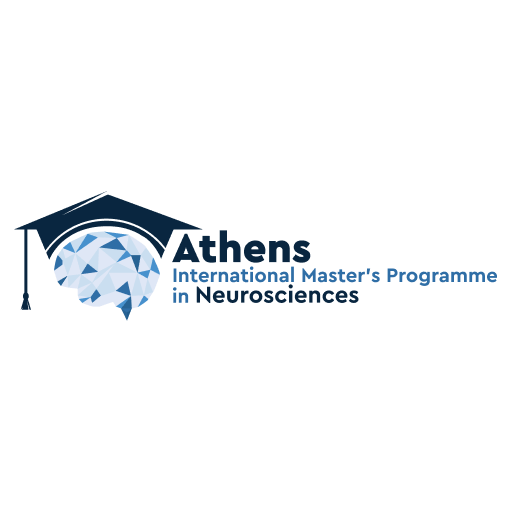Research Training Exercise (Laboratory Rotation) – Technical Courses IΙ Free
Teaching hours
This is a 1st semester course of about 8 weeks that corresponds to 10 ECTs and 39 total hours of lectures and approximately 320 total hours of laboratory presence/training.
It is subdivided into the following parts:
- Technical Courses IV: Methodological approaches in Neuroscience, Microscopy-neuroimaging
- Technical courses V: Methodological approaches in Neuroscience , Experimental animal models in Neuroscience
Co-ordinators
- Dimitra Thomaidou
Senior Investigator, Department of Neurobiology, Hellenic Pasteur Institute
- Stamatis Pagakis
Senior Research Scientist, Basic Research Center, Foundation for Biomedical Research of the Academy of Athens
Technical Courses IV: Methodological approaches in Neuroscience, Microscopy-neuroimaging
Description:
This is an intensive three-week course centered around the study of neuroimaging technologies, that includes lectures, laboratory/hands-on sessions and participation in the acquisition and analysis of neurophysiological/neuroimaging data. All material will focus primarily on learning the different imaging systems and technologies used to study the nervous system, from conventional microscopy to advanced in vivo imaging both in laboratory animals and humans. Attention will be given on learning current digital image processing tools used to analyze/ quantify imaging data. The goal of this intensive course is to provide students with knowledge of novel, state-of-the-art imaging approaches currently used to study nervous system function. Hands on laboratory sessions will allow students to learn through direct experience.
Course Overview
Teaching and some hands-on training of a wide range of imaging tools and technologies currently used to study nervous system morphology, function and dysfunction, both in laboratory animals and humans. The course covers general principles of microscopy (both optical and electron), nuclear and MR imaging, image processing and analysis, as well as advanced neurophysiological and functional neuroimaging approaches linking microscopic analysis with behavior. More specifically, the topics covered include:
- Introduction to human brain function imaging techniques
- Anatomical Neuroimaging
- Live cell dynamics imaging
- FLIM-FRET
- FRAP, in vivo FRAP
- Mechanosensors
- Multiphoton confocal microscopy
- Intravital imaging
- Calcium imaging at whole animal level
- Optogenetics
- Neurophysiology: EEG/MEG
- PET/SPECT Imaging
- fMRI Imaging
- Electron microscopy
- Image Processing (ImageJ, Imaris, Icy)
- Image Data analysis (MATLAB)
- Functional Imaging data preprocessing and analysis (SPM)
- Neurophysiological (EEG/MEG) data preprocessing and analysis (EEGLAB)
Skills & Learning Outcomes
Upon successful completion of this course, students will be able to:
- Know the basic principles of microscopy and the imaging systems used to study the nervous system.
- Know the latest applications of imaging technology currently used to answer scientific questions related to nervous structure and function and dynamic cellular interactions.
- Get in touch with software used for the processing of digital images/videos.
- Get hands-on training on advanced microscopy and Image Analysis systems currently available in the labs of the participating course instructors.
- Understand the design of experimental procedures used in neurophysiological (EEG/MEG) and functional neuroimaging fMRI) experiments to study human cognition
- Introduction to the preprocessing and analysis software tools used to analyze neurophysiological and functional neuroimaging data used in the labs of participating instructors.
Technical courses V: Methodological approaches in Neuroscience, Experimental animal models in Neuroscienc
Description:
This is an intensive lecture course focused on popular experimental models used on Neurobiological research. The course aims to explore the main attributes of various experimental systems that makes them suitable to or preferable to address particular types of questions and the depth and generality of answers thus obtained.
Course Overview
Interdisciplinary approach to functional neurobiology and its tools including transgenics, RNA interference, particular usefulness and contributions of selected model systems.
Each system will be examined/presented along the following axes:
- Usefulness of the model/ contributions
- Manipulations to make transfectants/transgenics
- Models/ examples of Neurochemistry
- Models/ examples of Cognitive and Neurodegenerative diseases.
Models will include
- Neuronal cells in culture
- Caenorhabditis elegans
- Drosophila melanogaster
- Mouse/Rat
Detailed syllabus
- Cultured neuron models
Advantages, uses, transfections
Models and examples for Neurochemistry, cultured systems as discovery tools
- C elegans:
Advantages for Neurobiological research, transgenics, RNAi
Signaling, aging, disease models
- Drosophila
Advantages for Neurobiological research, transgenics, tools
Neurogenetics, sensory and cognitive models
Cognitive and neurodegenerative disease models, pharmacogenetics
- Mouse
Advantages for Neurobiological research, transgenics
Cognitive models and methods, neuropharmacology
Neurodegenerative models and applications
Rat models, cognitive and neuropharmacology models
Titles of lectures and names of the lecturers
A/A | TECHNICAL COURSES: Neuro-Imaging, Animal models | Lecturers |
1 | Animal models of stress and anxiety | Antonis Stamatakis |
2 | Basic concepts of Behavioral Neuroscience | Irini Skaliora |
3 | Assessment of cognitive and motor function in rodent models | Alexia Polissidis |
4 | Human Neuroimaging methods. EEG/MEG, PET/SPECT Imaging | N. Smyrnis |
5 | fMRI Imaging | N. Smyrnis |
6 | Light Fluorescence Microscopy: Basic theory and Modern Techniques. Advanced techniques , FLIM-FRET, FRAP | S. Pagakis |
7 | C-elegans as experimental models in neuroscience | Konstantionos Palikaras |
8 | The drosophila model for studying neurodevelopment, learning and memory. Drosophila Models for studying cognitive and neurodegenerative diseases | M. Skoulakis |
9 | IMAGING: In vivo optical animal imaging (fluorescence / luminescence). Advanced imaging techniques- Light Sheet microscopy (SPIM) | V. Kostourou |
10 | Introduction in experimental models in neuroscience. | Spiros Georgopoulos |
11 | Image Analysis: Extracting quantitative information from fluorescence microscopy images. Software presentation: Neurolucida/ImageJ | S. Pagakis |
12 | IMAGING: Advanced imaging applications in the CNS of living animals: Multiphoton confocal microscopy, Calcium imaging at whole animal level, Optogenetics. Data analysis with Imaris and ICY | D. Thomaidou |
